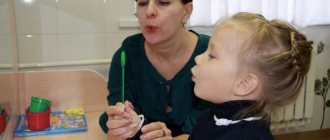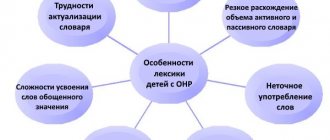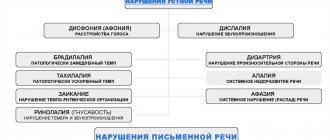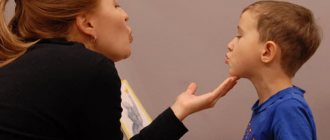Interaction between a teacher and a speech therapist in the correctional process of a speech therapy group
Lyubov Baklanova
Interaction between a teacher and a speech therapist in the correctional process of a speech therapy group
Planning the afternoon.
Interaction between a teacher and a speech therapist in the correctional process of a speech therapy group.
Carrying out the entire complex of correctional training during speech therapy work requires combining special classes to correct speech defects with the fulfillment of general program requirements. For speech therapy groups, a special daily routine has been developed that differs from the usual. provides frontal , subgroup and individual classes. Along with this, the class schedule includes time for classes according to a standard comprehensive program for preschool children. Along with this, in the evening hours are allocated for the teacher to work with subgroups or individual children on correction (development)
speech in accordance with the instructions
of the speech therapist . The teacher plans his work taking into account the requirements of both the standard comprehensive program and the speech capabilities of the children and their progress in mastering the correction program implemented by the speech therapist in accordance with the nature of the speech disorder.
In this regard, there is a need to ensure interaction and continuity in the work of the teacher and speech therapist in the speech therapy group . The teacher must know the main directions of the correctional program , the age and individual characteristics of the formation of speech of preschoolers, understand the features of the pronunciation and lexico-grammatical aspects of speech and take into account the speech capabilities of each child in the process of educational and extracurricular activities.
Continuity in the work of a speech therapist and teacher involves not only joint planning, but also the exchange of information, discussion of children’s achievements, both in speech and in other classes. All this is recorded in a special notebook.
Thus, the teacher of the speech therapy group performs , in addition to general educational tasks, a number of correctional tasks , the essence of which is to eliminate deficiencies in the sensory, affective-volitional, and intellectual spheres caused by the characteristics of the speech defect. At the same time , the teacher turns his attention not only to the correction of existing deficiencies in the child’s development, to enriching ideas about the environment, but also to the further development and improvement of the activities of intact analyzers. This creates the basis for the favorable development of the child’s compensatory capabilities, which ultimately affects the effective acquisition of speech.
The teacher should pay special attention of perception (visual, auditory, tactile, accessible forms of visual-figurative and verbal-logical thinking, motivation.
An important aspect of working in a speech therapy group is the development of cognitive activity and cognitive interests in children. In this case, it is necessary to take into account the peculiar lag in the formation of cognitive processes in general , which develops in children under the influence of speech underdevelopment, narrowing of contacts with others, incorrect methods of family education and other reasons .
Correct, pedagogically justified interaction between a teacher and a speech therapist , combining their efforts in the interests of speech correction in children , is based on the creation of a friendly, emotionally positive environment in a speech therapy group . The teacher’s work on speech development in many cases precedes speech therapy classes , prepares children to perceive the material in future speech therapy classes , providing the necessary cognitive and motivational basis for the formation of speech knowledge and skills. In other cases, the teacher focuses his attention on consolidating the results achieved by children in speech therapy classes .
The specificity of the work of a teacher in a speech therapy group is that the teacher organizes and conducts classes on the instructions of the speech therapist . individual or subgroup lessons with children in the afternoon after nap time (before or after afternoon snack)
.
5-7 children are invited to an evening speech therapy
• consolidation of well-placed sounds (pronunciation of syllables , words, sentences)
;
• repetition of poems, stories;
• exercises to develop attention, memory, logical thinking, phonemic hearing, sound analysis and synthesis skills;
• activation of coherent speech in a conversation on familiar lexical or everyday topics.
In the process of correctional work, the teacher pays great attention to the development of fine motor skills. So, during extracurricular time, you can invite children to put together mosaics, puzzles, figures from matches or counting sticks, practice untying and tying shoelaces, collect scattered buttons or small objects, and pencils of different sizes. Children can be offered work in notebooks to develop writing skills, recommended for children with speech disorders.
A special place in the work of the teacher is occupied by the organization of outdoor games for children with speech disorders, due to the fact that children in this category are often somatically weakened, physically intolerable, and quickly get tired. When planning work on organizing play activities, the teacher must clearly understand the reality of the physical capabilities of each child and differentiated selection of outdoor games
Games with movement must be combined with other types of children's activities. Outdoor games simultaneously help the successful formation of speech. They often contain sayings and quatrains; they can be preceded by a counting rhyme for choosing a driver. Such games also contribute to the development of a sense of rhythm, harmony and coordination of movements, and have a positive effect on the psychological state of children.
The work of a teacher in teaching children role-playing games is also a necessary element of pedagogical activity in a speech therapy group . In role-playing games, the teacher activates and enriches the vocabulary, develops coherent speech, and teaches ritual interaction in social and everyday situations familiar to the child (doctor’s appointment, shopping in a store, traveling on public transport, etc.)
.
Role-playing games contribute to the development of communication and speech skills, stimulate children’s sociability, and develop social skills and abilities.
Particular importance is given to studying children's capabilities in using various types of coherent statements - from simple sentences to composing stories with elements of their own creativity. The ability of children to convey the content of a familiar literary text was determined. For this, the following tasks are offered:
The first task is for children to compose proposals on questions for five separate pictures ( “Tell me, what is drawn here?”
).
The second task is to reproduce a familiar fairy tale that is simple in structure and small in volume ( "Turnip"
).
The third task is to compose a story based on a series of plot pictures.
The fourth task is to compose a story from experience on a topic close to children: “On our site”
.
The purpose of the task is to identify the individual level and characteristics of children’s mastery of phrasal and monologue speech when conveying their life impressions (a story plan was proposed)
.
Tasks of joint work between a speech therapist and educators
- Together, find the best options for working with a specific group and with each child individually, agree on the organization, conduct of classes, and their content.
- Arrange classes so that the speech therapist does not duplicate the tasks that the teacher gives to the children, and vice versa.
- Teach children correct sound pronunciation, perception and reproduction of words. Teach them to maintain the correct pace and rhythm of speech (not to chatter, but also not to speak too slowly).
- Expand the vocabulary of preschoolers.
- Help children study the process of word formation and grammatical structure. It is recommended to correct grammatical errors in speech not only in class, but also during walks, games, etc.
- Develop higher mental functions: thinking, imagination, attention, memory. Form coherent speech among students.
- Develop fine and articulatory motor skills in children.




